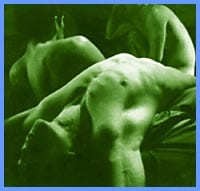In 1998, gay audiences were introduced to one of the most delicate and affectionate representations of same-sex desire in Muslim cultures: the Italian-Turkish film Steam.
This summer, brace yourselves for gay director and writer Kutlug Ataman’s chilling dramatization of the state of homosexuality in Berlin’s working-class Turkish community: the dark and gritty Lola And Billy The Kid.
Think of Lola as not so much a companion piece to Steam but as its disturbed sibling. The tacit acceptance of homoeroticism in Steam – a culmination of centuries of cultural representations that have viewed the East as a sexual playground for world-weary Westerners – is replaced with an explosive examination of sexual stereotypes in immigrant communities.
The main story – there are three interconnected ones – is that of a Turkish drag queen (Gandi Mukli) who goes by his stage name of Lola and his relationship with his male hustler lover Billy (Erdal Yildiz).
The archetypal Turkish macho man, Billy would rather subject Lola to a sex change than admit to being in a gay relationship. “We can’t love together like these German fags,” he tells Lola.
Murat (Baki Davrak), a beautiful 17-year-old school boy, is experimenting with his gay sexuality just as his brother Osman is beginning to suspect it. A family secret links Murat’s story and Lola’s in a predictable but endearing way. A comic subplot traces the evolving relationship between a middle-aged, German aristocrat and a Turkish hustler.
Ataman has crafted a tight script that flows seamlessly from scenes set in Berlin’s seedy parks, hangouts of neo-Nazi youths, ghetto homes of traditional immigrant families and country homes of German aristocracy to belly-dancing, drag bars.
Too bad that the overall thrust of the narrative is so melodramatic and overwrought, relying too heavily on the once-respectable, now fallen woman stereotype. Watching Lola And Billy The Kid is like taking a step back in time: Rewind your clocks to Hollywood in the 1960s where the only happy homosexual is a dead one and where gay men are either drag queens who want to be women or violently repressed sociopaths. This may describe where homosexual rights – if such a notion exists – stand in immigrant Turkish society, but it doesn’t provide a rewarding viewing experience.
Ataman – who elicits fine performances from his cast – is way over his head in the last 20 minutes of the film which sees it transform (rather inexplicably) from a sociological study into a hackneyed revenge thriller.
Lola And Billy The Kid more than makes up for its lack of sophistication in its insider’s view of the trouble contemporary Muslim cultures face when it comes to homosexuality. Never have the multiple attitudes towards masculinity, homosexuality and femininity – and their interrelationship – been as tightly and persuasively dramatized in all their maddening contradictions as they have here.
Billy is more than just a character; he’s both a representative and a victim of centuries-old prejudices and fears.
Given the doom and gloom that follows his characters, it’s riveting to see how Ataman ends his film with a scene that offers a glimmer of hope for both gay and womenís rights. It’s a cinematic sleight of hand but offers a welcome finale to this weird but absorbing little film.
Lola And Billy The Kid is now playing at the Carlton Cinemas (20 Carlton St; 598-2309).

 Why you can trust Xtra
Why you can trust Xtra


